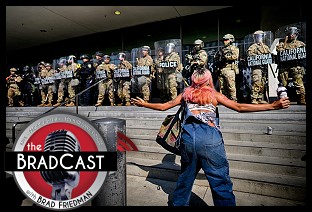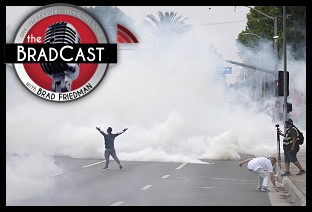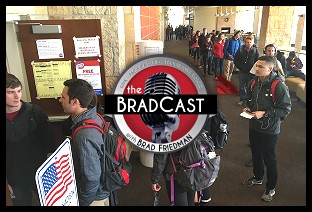 The same U.S. 7th Circuit Appeals Court panel that, in 2014, opened the door to mass disenfranchisement via Wisconsin's strict GOP-enacted Photo ID voting law ("Act 23"), has now issued a decision that could, in many instances, lead to the reinstatement of the precious right of citizens to cast votes.
The same U.S. 7th Circuit Appeals Court panel that, in 2014, opened the door to mass disenfranchisement via Wisconsin's strict GOP-enacted Photo ID voting law ("Act 23"), has now issued a decision that could, in many instances, lead to the reinstatement of the precious right of citizens to cast votes.
Specifically, the panel determined in a ruling issued last week, Wisconsin's strict photo ID restrictions may not be used to disenfranchise any voter who lacks the ability "to obtain a qualifying photo ID with reasonable effort." The appellate court has remanded the matter back to the trial court so that the District Court Judge who heard the original case can determine how to best fashion a remedy that could keep many otherwise legal and often long-time voters from being turned away again at the ballot box.
The new ruling in the Frank v. Walker case comes too late for approximately 300,000 disproportionately minority and poor voters (nearly 10% of the Badger State electorate), who may have been disenfranchised during the state's recent April 5th primary election. It is difficult yet to ascertain the precise effect the polling place Photo ID restriction had in either the Republican or Democratic Presidential primaries that day, but the restrictions had the potential to alter the outcome of those races as well as a Wisconsin Supreme Court contest. The Scott Walker-supported Republican, Rebecca Bradley, reportedly defeated independent jurist JoAnne Kloppenburg by approximately 95,000 votes. The highly controversial Bradley was thus elected to serve out a 10-year term on the Badger State's highest court after being appointed by Walker to fill a vacancy last year.
As ordered by the federal appellate court, U.S. District Court Judge Lynn Adelman may now provide a remedy for those whom ACLU attorney Sean Young described as the "most impacted" by Wisconsin's polling place Photo ID restrictions. The likely remedy was outlined by the 5th Circuit panel, which noted that the new decision was intended to bring Wisconsin's law in line with Indiana law where a voter "who contends he has been unable to obtain a complying photo ID for financial or religious reasons may file an affidavit to that effect and have his vote provisionally counted."
The court ruled the restriction on voting should not be applied to three classifications of voters for whom the plaintiffs had sought relief:
Had such a remedy been in place before the state's recent primary, voters like Eddie Lee Holloway, a 58-year-old African-American man who moved from Illinois to Wisconsin in 2008 and voted without problem there until the WI GOP's Act 23 was instituted, might not have been disenfranchised at all. Holloway, despite owning at least three different forms of ID, including his expired Illinois photo ID, birth certificate and Social Security card, was unable to obtain the required Photo ID to vote in WI, as The Nation's Ari Berman documented last week. "He’d spent $200, visited two states, and made seven trips to different public institutions" in his effort to get an ID to vote, "but still couldn’t vote in Wisconsin," Berman reported, in yet another now-all-too-common tale of longtime voters facing absurd new obstacles simply trying to cast a vote in the wake of such new voting restrictions.
But Holloway was hardly alone...


 Sunday 'Total Obliteration' Toons
Sunday 'Total Obliteration' Toons Thank You For Your Attention to This Matter:
Thank You For Your Attention to This Matter: 'Green News Report' 6/26/25
'Green News Report' 6/26/25
 Mamdani Primary 'Win' Augurs New Generation of Progressives Rising: 'BradCast' 6/25/25
Mamdani Primary 'Win' Augurs New Generation of Progressives Rising: 'BradCast' 6/25/25 U.S. Authoritarianism Under-way (But We're Still Here to Fight It): 'BradCast' 6/24/25
U.S. Authoritarianism Under-way (But We're Still Here to Fight It): 'BradCast' 6/24/25 'Green News Report' 6/24/25
'Green News Report' 6/24/25 'Anti-War' Trump Attacks a Mid-East Nation on False Claims About WMD: 'BradCast' 6/23/25
'Anti-War' Trump Attacks a Mid-East Nation on False Claims About WMD: 'BradCast' 6/23/25  Sunday 'Peacemaker' Toons
Sunday 'Peacemaker' Toons Senate Health Care Cuts 'More Extreme' Than House Version: 'BradCast' 6/19/25
Senate Health Care Cuts 'More Extreme' Than House Version: 'BradCast' 6/19/25 'Green News Report' 6/19/25
'Green News Report' 6/19/25 What 'Anti-War President'? MAGA Civil War Over Trump, Iran: 'BradCast' 6/18/25
What 'Anti-War President'? MAGA Civil War Over Trump, Iran: 'BradCast' 6/18/25 Trump Calls for 'Remigration', a Codeword for 'Ethnic Cleansing': 'BradCast' 6/17/25
Trump Calls for 'Remigration', a Codeword for 'Ethnic Cleansing': 'BradCast' 6/17/25 'Green News Report' 6/17/25
'Green News Report' 6/17/25 Last Weekend Today: 'BradCast' 6/16/25
Last Weekend Today: 'BradCast' 6/16/25 Sunday 'Despot Times, Despot Measures' Toons
Sunday 'Despot Times, Despot Measures' Toons Then They Came for the U.S. Senators: 'BradCast' 6/12/25
Then They Came for the U.S. Senators: 'BradCast' 6/12/25 'Green News Report' 6/12/25
'Green News Report' 6/12/25 Lawless Trump Warms Up for Insurrection Act: 'BradCast' 6/11/25
Lawless Trump Warms Up for Insurrection Act: 'BradCast' 6/11/25 Trump Inciting Violence, State of Fear in L.A., Elsewhere: 'BradCast' 6/10/25
Trump Inciting Violence, State of Fear in L.A., Elsewhere: 'BradCast' 6/10/25 Nevermind Elon and Epstein Files, Trump Declares L.A. 'Riots'!: 'BradCast' 6/9/25
Nevermind Elon and Epstein Files, Trump Declares L.A. 'Riots'!: 'BradCast' 6/9/25 'Jesus Weeps' at Trump's
'Jesus Weeps' at Trump's 300k 'Preventable' Deaths Since Trump USAID Shutdown: 'BradCast' 6/4/25
300k 'Preventable' Deaths Since Trump USAID Shutdown: 'BradCast' 6/4/25 Storm Warnings: 'BradCast' 6/3/25
Storm Warnings: 'BradCast' 6/3/25 SCOTUS Ignores Own Precedents In Recent 'Emergency' Rulings: 'BradCast' 6/2/25
SCOTUS Ignores Own Precedents In Recent 'Emergency' Rulings: 'BradCast' 6/2/25 'A World of Tyrants, Bribes, and Influence': 'BradCast' 5/22/25
'A World of Tyrants, Bribes, and Influence': 'BradCast' 5/22/25
 VA GOP VOTER REG FRAUDSTER OFF HOOK
VA GOP VOTER REG FRAUDSTER OFF HOOK Criminal GOP Voter Registration Fraud Probe Expanding in VA
Criminal GOP Voter Registration Fraud Probe Expanding in VA DOJ PROBE SOUGHT AFTER VA ARREST
DOJ PROBE SOUGHT AFTER VA ARREST Arrest in VA: GOP Voter Reg Scandal Widens
Arrest in VA: GOP Voter Reg Scandal Widens ALL TOGETHER: ROVE, SPROUL, KOCHS, RNC
ALL TOGETHER: ROVE, SPROUL, KOCHS, RNC LATimes: RNC's 'Fired' Sproul Working for Repubs in 'as Many as 30 States'
LATimes: RNC's 'Fired' Sproul Working for Repubs in 'as Many as 30 States' 'Fired' Sproul Group 'Cloned', Still Working for Republicans in At Least 10 States
'Fired' Sproul Group 'Cloned', Still Working for Republicans in At Least 10 States FINALLY: FOX ON GOP REG FRAUD SCANDAL
FINALLY: FOX ON GOP REG FRAUD SCANDAL COLORADO FOLLOWS FLORIDA WITH GOP CRIMINAL INVESTIGATION
COLORADO FOLLOWS FLORIDA WITH GOP CRIMINAL INVESTIGATION CRIMINAL PROBE LAUNCHED INTO GOP VOTER REGISTRATION FRAUD SCANDAL IN FL
CRIMINAL PROBE LAUNCHED INTO GOP VOTER REGISTRATION FRAUD SCANDAL IN FL Brad Breaks PA Photo ID & GOP Registration Fraud Scandal News on Hartmann TV
Brad Breaks PA Photo ID & GOP Registration Fraud Scandal News on Hartmann TV  CAUGHT ON TAPE: COORDINATED NATIONWIDE GOP VOTER REG SCAM
CAUGHT ON TAPE: COORDINATED NATIONWIDE GOP VOTER REG SCAM CRIMINAL ELECTION FRAUD COMPLAINT FILED AGAINST GOP 'FRAUD' FIRM
CRIMINAL ELECTION FRAUD COMPLAINT FILED AGAINST GOP 'FRAUD' FIRM RICK SCOTT GETS ROLLED IN GOP REGISTRATION FRAUD SCANDAL
RICK SCOTT GETS ROLLED IN GOP REGISTRATION FRAUD SCANDAL VIDEO: Brad Breaks GOP Reg Fraud Scandal on Hartmann TV
VIDEO: Brad Breaks GOP Reg Fraud Scandal on Hartmann TV RNC FIRES NATIONAL VOTER REGISTRATION FIRM FOR FRAUD
RNC FIRES NATIONAL VOTER REGISTRATION FIRM FOR FRAUD EXCLUSIVE: Intvw w/ FL Official Who First Discovered GOP Reg Fraud
EXCLUSIVE: Intvw w/ FL Official Who First Discovered GOP Reg Fraud GOP REGISTRATION FRAUD FOUND IN FL
GOP REGISTRATION FRAUD FOUND IN FL




















 Today on
Today on  On today's
On today's 







 Today on
Today on  Today on
Today on 
 On today's
On today's  Unless either the U.S. 5th Circuit Court of Appeal or Supreme Court intervenes, more than 608,000 lawfully registered Texans, who were illegally disenfranchised during three successive elections (the General Elections in 2014 and 2015 and this year's Presidential Primary), are likely to again be barred from casting a vote in the November 2016 general election.
Unless either the U.S. 5th Circuit Court of Appeal or Supreme Court intervenes, more than 608,000 lawfully registered Texans, who were illegally disenfranchised during three successive elections (the General Elections in 2014 and 2015 and this year's Presidential Primary), are likely to again be barred from casting a vote in the November 2016 general election.
 On today's
On today's  On today's
On today's 
 On today's
On today's 












